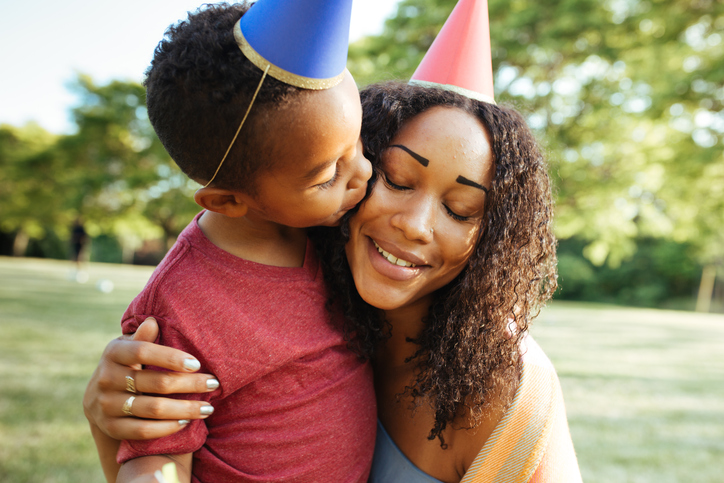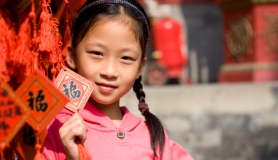Everybody loves a birthday! It’s a time to show how much you love and cherish someone, to celebrate the fact that they are alive. If it’s your birthday it’s a time to be showered with love and gifts yourself! But have you ever wondered why birthdays were first celebrated? Or indeed who the first people were to do it? Birthdays now seem to revolve more around consumerism and less around celebrating with a loved one and wishing them another year filled with happiness.
Before people had a way of marking time, it was not possible to celebrate the exact anniversary of events such as birthdays, and thus they were not deemed particularly important. Only when ancient ones began to notice the moon’s cycles did they pay attention to the changing seasons and indeed their interminably cyclical nature. Eventually, the fi rst calendars were formulated in order to mark time changes and important events. Then came the concept of years, and with it the ability to celebrate birthdays and other signifi cant anniversaries on the same day each year. Birthdays have been celebrated throughout history, predating Christianity. There is in fact a question in modern Christianity as to whether it is a “sin” to celebrate birthdays at all, as they were originally a Pagan celebration. Happily however, birthday celebrations are something so ingrained into modern society that the vast majority of people celebrate the birthdays of their loved ones without such thoughts even entering into the equation! So if birthdays were originally Pagan celebrations, was there a particular reason why birthdays were celebrated? In Pagan cultures, many celebrations were as a result of the inherent fear of the influence of evil spirits, and celebrations were a way of warding off any negative influences. It was a commonly held belief that evil spirits had more of an influence at times of change, and becoming a year older was considered to be one such vulnerable stage. Thus birthdays were jovial occasions celebrated with family and friends who surrounded the celebrant with positive thoughts and happy wishes for the year to follow. Laughter and joy cocooned the person of honour, protecting them from harm. Gifts were not usual at these celebrations, but should the celebrant receive a gift it was believed that they would be especially lucky in the coming year. However, birthdays were not always for the ‘humble folk’. Birthdays of powerful and wealthy individuals have been celebrated for thousands of years. Records show that Egyptian pharaohs, as well as powerful Romans organized celebrations around their birthdays. It was also the Egyptians who were first to employ the use of a calendar, which debuted in 4236 B.C, a date which is referred to as “the earliest known date”. As the centuries passed, birthdays began to be celebrated by others of wealth and position. Today many nations annually honour the birthdays of their past great leaders or current royalty with special events. Although historians are certain that people have observed birthdays for quite some time, there are very few of such celebrations documented. Of the descriptions that do exist, only those birthdays of kings, nobility, and other important figures have been recorded. It is therefore believed that ‘common’ people (especially children) did not celebrate their birth in such times. This belief has been rationalized by a theory that nobility were the only people wealthy enough to have such celebrations on a practical level, and quite possibly were the only ones deemed important enough to have been written about or remembered. Yet eventually, birthday celebrations became a tradition around the world, regardless of age or status.
How do people traditionally celebrate birthdays?
Birthdays are celebrated in a myriad of different ways around the globe, but the sentiment is always the same – being glad that you have a special person in your life, and bestowing upon them the wish that the year to follow will be a happy one. Different cultures have created their own rituals, based upon spiritual beliefs and & ancient customs. Although some may seem strange to us in the western world, each one is equally heartfelt. For example, in many African cultures the birth of a child is not seen as especially important – it is only when a child ‘comes of age’ that they are celebrated and integrated into the community in a group celebration of many children. However, the Asante people of Ghana celebrate “krada” (Soul Day). This celebration begins with a cleansing ritual intended to purify the soul. On a person’s krada, he or she washes with a special leaf soaked overnight in water. The afternoon is spent feasting with family and friends. Egyptian birthday parties are celebrated when a child is a year old and are occasions full of dancing and singing, with flowers and fruit to decorate the party as symbols of life and growth. In Israel, the birthday child sits in a special chair decorated with fresh flowers. Family and friends gather around the chair raising it once for each year of the child’s age, plus one for good luck! The Chinese believe that the spirit of tigers protects children, and so newborns are bestowed with gifts decorated with tigers by their family. Another custom is to surround a child on its first birthday with a variety of objects pertaining to various vocations. It is believed that the object a child picks up, or is attracted to is symbolic of their future occupation. In Hong Kong and various Chinese communities, special noodles, which are very long, are served in honour of the birthday child to symbolize a long life. In Japan, when children become 7, 5, or 3 years old, they participate in the annual Shichi-go-san (meaning “Seven-Five-Three”) Festival, celebrated annually on November 15. According to Japanese tradition, these numbers are especially lucky, and so during this festival, children and their families visit sacred places to give thanks, and ask to be blessed in the future. Families will often have a party for the child afterwards. The Latinos have a wonderful ceremony known as “Quinceanera”, marking the transition into adulthood, which is celebrated on a girl’s 15th birthday. Often included on this day is a religious ceremony at church, at which the young woman pays tribute to her heritage and acknowledges the start of a spiritual journey. Many Quinceaneras include a candle-lighting ceremony, where the young woman lights her parents’ candles using the flame of her own, a process that is then continued through all the generations present. Native American tribes celebrate the milestones in a child’s development and life journey, rather than the day he or she was born. Significance is placed upon a child’s first smile right through until marriage, which is a beautiful way of honouring your child. It is traditional in England (though not often practised now) to bake a cake filled with trinkets. This custom stems from the medieval tradition of mixing a coin and a thimble into the cake batter. Whoever found the coin in their slice of cake would be wealthy. However, the unlucky person to find the thimble was said to never marry!
One of my favourite customs is the candlemagic ritual we partake in once a year. A candle-lit cake is presented to the celebrant, accompanied by the song “Happy Birthday to you”, (which was written as a classroom greeting in 1893 by two American teachers, sisters Mildred J. Hill, and Dr. Patty Smith Hill, and was originally called “Good Morning To All.”). Once the song has been sung, a silent wish is made and the candles blown out. This custom dates back to worship of Artemis, Greek Goddess of the Moon. To celebrate her day, cakes were baked in the shape of a crescent moon and decorated with candles. It was believed that the Goddess would look upon the worshippers with favour if they could blow out the candles in a single breath. So, be it ancient myth, or a modern-day spell, our birthday cake tradition is truly magic!
Creating your own traditions
As mentioned earlier, the celebration of birthdays in our modern culture seems to have exchanged sentiment and custom largely for more avaricious and consumerist ideals. The time has come perhaps to create a personal ritual – a meaningful celebration of the people who mean the most to us, lest we forget why we celebrate birthdays at all. As we have seen, there are many traditions, but sadly we seem to have abandoned them to a large degree. This is detrimental to the people we have the largest celebrations for – our children. There is no moment in life as poignant as the birth of your own child. In that moment we are transformed, in every way imaginable. No longer can we be selfi sh, or greedy. Our new focus is the precious life we hold in our arms – our fi rst experience of someone we would genuinely die for – without a second thought. Why then have birthdays become simply a time for gift giving? Of fi zzy pop, sweets and cake? We have forgotten the signifi cance of what the word itself implies; Birth – Day. We surely could celebrate the most precious people in our lives a little better, in a more personal and less consumerist way? Birthdays have become a mini mountain of primary coloured, injection moulded plastic, or a card containing money for older children. Of course it is not suggested that these gifts are given without thought or love, but wouldn’t it be wonderful to have a tradition that our children will always remember? Something more personal? The majority of that plastic is soon broken or forgotten, the money soon spent. Creating your own tradition needn’t be complicated. It could be something as simple, yet as rewarding as baking a birthday cake together. Children like nothing more than the undivided attention of a parent or loved adult, and their birthday is the perfect excuse to make time. A birthday throne makes the celebrant feel especially honoured on the big day. Get up early and decorate a chair with fresh fl owers, ribbons, seashells, crystals etc and place a crown, made from gold paper or twisted ivy on the table in front of the chair. The birthday boy or girl gets to sit in his or her throne for every meal and wear her special crown. Festive hats could be made for other members of the family as well. Another nice way to mark the passing of the year is to write your child a special letter detailing all that you love about them, each of their endearing characteristics and their achievements over the past twelve months. This can be as silly or serious as you like but you can be sure that they’ll be treasured in years to come as children love to reminisce about what they were like when they were little. As your child accumulates new life skills, a letter serves as a reminder of what they have done over the years. If you do have the time and inclination for something a little more involved, then you could perform your own ritual. Assemble your child’s most precious possessions, plus your own treasured items. These might include drawings or a first tooth and also some items of significance from your own childhood. Place these together, carefully arranged in a special safe place, such as your mantelpiece, along with a lovely photograph of your child. To this you may add candles, crystals and other items you deem appropriate. Especially wonderful would be an item to symbolise each of the four elements – air, earth, fi re and water to bless your celebration. For example you could have a crystal for earth, a feather for air, a candle for fi re and a seashell for water. Add to this some incense, cakes and delicious drinks, and you are all set for a memorable celebration to honour your child. This celebration is especially poignant if it is carried out (if at all possible) at the child’s actual time of birth. Gather those people special to your child, and have them form a circle, holding hands if your child wishes. Light your candles, and then explain the significance of each of the objects. This is a wonderful exercise, as most of the objects will undoubtedly have some beautiful memories attached to them, which your child will love to hear. Ask for the blessing of the God and Goddess, and tell the story of your child’s birth. Dance, make merry, share lots of hugs and kisses, and celebrate this most wonderful person in your life, you can guarantee it will make for a birthday they will never forget!
Amy Warburton is a designer, candle-maker, hedgewitch and mother of two boys. Amy runs www.brighterblessings.co.uk designing and making beautiful herbal beeswax candles, spell candles and gift sets.







